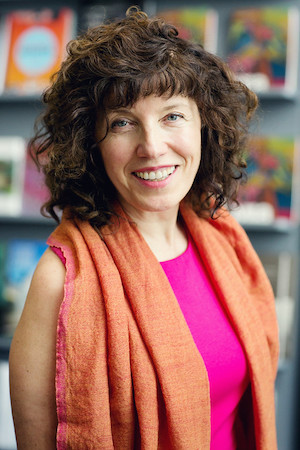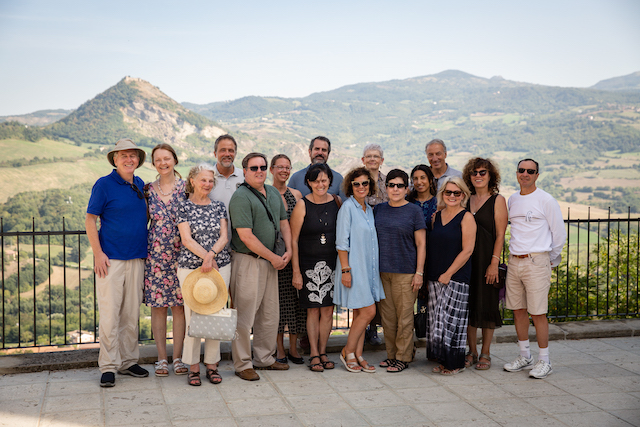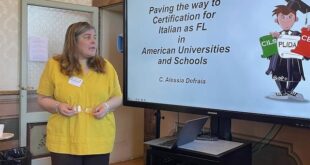Anna Bonavita nonprofit tour series uplifts the towns she explores while immersing visitors in a rejuvenating culinary, cultural and communal experience.
Science launched Anna Bonavita’s career, but an appreciation for art led her to create an Italian film festival, a cultural center and a series of highly personal, connoisseur-level cultural tours to Italy.
After she immigrated to the United States to work in Minneapolis, her quest for friendship, community and the familiar comforts of Italy propelled her to start the film festival. A random event stirred up a romance with an Italian senator, who came to Minneapolis to help her create the cultural center, and the two married.
 After cancer took his life, Bonavita’s process of grieving and healing led her to explore the small towns of his native Emilia-Romagna. Those towns contained remarkable treasures, but a lack of jobs was forcing young people to leave, precipitating a slow decline. From the ashes of Bonavita’s grief grew a desire to help, and Esperienza, a nonprofit tour series, was born.
After cancer took his life, Bonavita’s process of grieving and healing led her to explore the small towns of his native Emilia-Romagna. Those towns contained remarkable treasures, but a lack of jobs was forcing young people to leave, precipitating a slow decline. From the ashes of Bonavita’s grief grew a desire to help, and Esperienza, a nonprofit tour series, was born.
She designs tours that include language and culture, but also exquisite meals at world-class restaurants. Halted by COVID, the tours will continue next year, and Bonavita will make sure they include plenty of time for participants to develop relationships with Italians and experience the pleasures — gastronomic, artistic and otherwise — of Italian life.
Bonavita spoke to Fra Noi from her Minneapolis home.
Fra Noi: You grew up in Bulgaria. How did you develop an affection for Italy, and how did you come to the United States?
Bonavita: It was very easy because the Italian culture was quite welcome in Eastern Europe. The Italian Communist Party was quite pro-Soviet, and as a result, Italian culture was widely celebrated in Russia, Bulgaria and elsewhere. So you heard Italian on the radio, you listened to Italian music, you read Italian books.
As for how I got to the United States — well, again, it goes back to politics. At the end of the Cold War, the economy collapsed, and there were no jobs. I was fresh out of university. I have a Ph.D. in physics, so it was possible to leave. I was most fortunate to be able to come and do research at Carnegie Mellon University in Pennsylvania. Then I moved to Minneapolis for a job. But I found myself isolated, and I started thinking about founding an Italian cultural center because I knew that plenty of Americans were fascinated with Italy.
Fra Noi: Tell us how you met your husband.
Bonavita: In 2003, I went to a wedding in England. A friend in Emilia-Romagna had had a bicycle accident, so I took a flight to Italy to see her. That’s where I met my husband, who was at that time one of the senators from Emilia-Romagna for the republic of Italy. When he retired, he decided to discover America. So he joined me in Minnesota in 2006. We got married in 2010.
Fra Noi: Did you and he pursue Italian identity in some way?
Bonavita: I started work on the Italian Cultural Center (of Minneapolis) in January 2006. He arrived in September, and we had the inauguration. The whole thing started because we wanted to have an Italian film festival but needed to pay for a theater. Someone suggested starting an Italian cultural center and having the revenue from language classes pay for it. We did and it proved successful. In 2009, I became the director of the Italian Film Fest of Minneapolis/St. Paul. I believe in sharing the beauty of Italian culture; it belongs to humanity.
Fra Noi: We understand you went through a difficult period and had to grieve and heal.
Bonavita: Yes, cancer took my husband. But in spite of that, I feel like to have met him was one of the greatest gifts in my life.
When he got ill, we moved to Italy so he could be close to his family and friends. After he died, I didn’t want to come back because it was a painful experience. But the universe works in amazing ways. When you struggle, people step forward and help you. And that’s how I discovered the friendships of people in these small towns. One woman took me to this little town, Pennabilli, to show me the beauty there.
So many aspects of this town appealed to my soul. I kept going back, and eventually I made friends there. But it’s losing young people; there are no jobs. So I thought, “Let’s have a summer Italian language program here and bring a little life.” But I’m a foodie and I’ve studied seriously, and I thought of also offering a gastronomy tour. This is how Esperienza came to life.
Fra Noi: How did Esperienza evolve?
Bonavita: The planning started in 2017, and the first group came in August 2018. I worked with a group of volunteers, and we did everything.
So we took the group to Osteria Francescana, Massimo Bottura’s restaurant, which was declared the best in the world, but also to Casa Artusi. We went from casalinga cooking, which is essential for understanding Italian cooking, to Massimo Bottura. It was extraordinary.
We had a deep immersion language class. We brought a band and danced and sang with the residents. We arranged with a local meat shop, museum, bar and grocery that our students would “help” them for an hour or so. It gave our participants the opportunity for direct interaction.
From the very beginning, Esperienza offered a different type of travel — connecting with people. We also imagined travel that benefits the local environment, the cultural heritage, the community, the economy. When we make a profit — next year, I hope — 100 percent will go back to local projects. Our travel is carbon neutral.
Fra Noi: What are your future plans?
Bonavita: We decided to look forward to 2022 because it could be a little risky this year. So we’ll do two language immersions: one in Pennabilli and one in Verucchio, also a fascinating place. Villanova culture was based there. It’s pre-Etruscan. If you could just see the jewelry these women were wearing five centuries before Christ — stunning! We’ll do a special immersion focusing on food and language.
In total, we’ll do two language tours, two culinary tours, a mosaic tour in Ravenna, known as the capital of mosaics, and one in Faenza, a world capital of ceramics.
Fra Noi: Why is it important to save towns in Italy where population is declining?
Bonavita: I was born in a village, and I appreciate this way of life. I believe that, especially after COVID, people will realize we derive the most joy from being with small groups of people. In these towns, there is so much beauty, so many opportunities for nurturing relationships. What makes us human can be found in these places; the kindness, generosity, joy of sharing, opportunity to explore. This is where we’re at our best.
For details, click here.
The above appears in the August 2021 issue of the print version of Fra Noi. Our gorgeous, monthly magazine contains a veritable feast of news and views, profiles and features, entertainment and culture. To subscribe, click here.
 Fra Noi Embrace Your Inner Italian
Fra Noi Embrace Your Inner Italian







